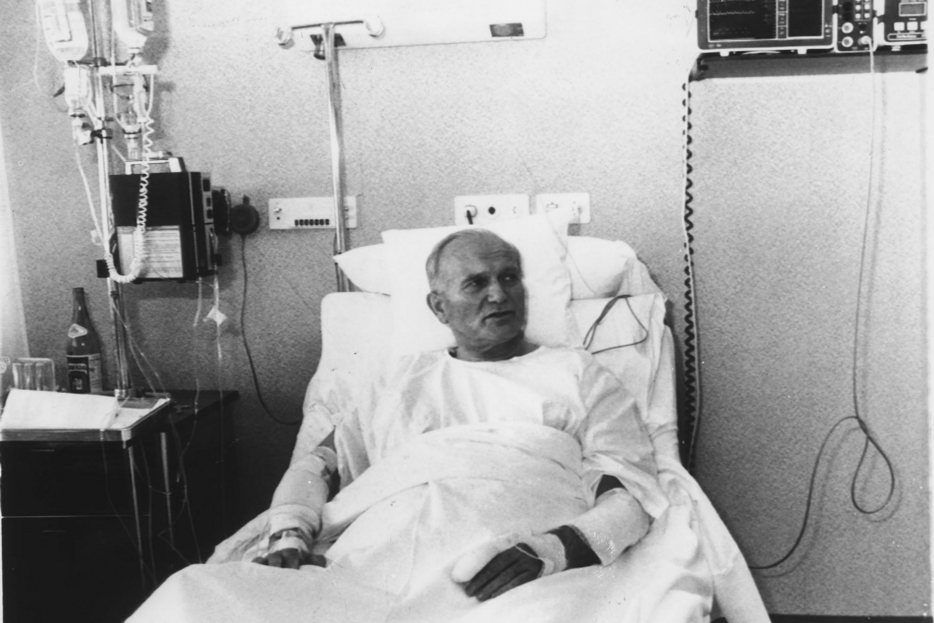John Paul II in his room on the tenth floor of the Gemelli Polyclinic one week after the attack in 1981 – Archivio Ansa
«I met the Pope, I found him well, with energy, with the lively and youthful gaze and the voice of all time. He told me that after the operation he feels fine, follows all the instructions of his doctor and is leading a completely normal life. I found him happy, we talked at length about the most urgent international issues, including his meeting with American President Joe Biden ”, scheduled for today. The Argentine journalist and doctor Nelson Castro reported this to his colleagues yesterday morning on the sidelines of the presentation of his book «The health of the Popes. Medicine, conspiracies and faith from Leo XIII to Francis ». «For me – explained Castro – it was important to realize personally and as a doctor the state of health of the Pope after the operation and the diagnosis of colonic diverticular stenosis, and I must say that his recovery is incredible. I saw it really well. We have a Pope, at the age of 84, in excellent health, “he concluded.
The volume published by Piemme, was born precisely on the initiative of Francesco who years ago, in a meeting with the doctor-journalist, had launched the idea being also aware of the fact that Castro wrote, years ago, an exhaustive book on the health of Argentine presidents.
“When I want to know something about my health, I open the newspapers”, John Paul II joked. And certainly Karol Wojtyla was the Pope about whose health there was much talk in the international press, starting with the dramatic attack suffered in St. Peter’s Square on the afternoon of May 13, 1981. The bullets fired by the Turkish terrorist Alì Agca made him arrive in very serious condition. at the Gemelli Polyclinic where he underwent a long and delicate operation that saved his life, but it was also the beginning of a small medical ordeal, not to mention the subsequent hospitalizations and the last dramatic stretch of his life between February and April 2005. Certainly the theme of the Pope’s health, with John Paul II experienced a truly new and, in part, transparent season. Think of the great mystery about the prostate operation to which Paul VI was subjected in the Vatican in 1967, and instead of the hundreds of cameras and journalists under the windows of the Gemelli in the various shelters of Pope Wojtyla. Or the recent hospitalization always at the Gemelli Polyclinic for an intervention by Pope Francis, who in Castro’s book gave an interview to the author precisely about his health over the years.
Previously, in short, the state of health of a Pontiff was covered by the strictest reserve and only when death was near did it become the subject of official communications.
The Argentine journalist Nelson Castro tells it well in the book The health of the Popes. Medicine, conspiracies and faith from Leo XIII to Francis (Piemme; pages 332; € 18.50), which papacy after papacy traces the theme from the beginning of the last century. A book written, says the author, “at the invitation of Pope Francis”, who granted the Argentine journalist a long interview on his health and which concludes the volume. A choice, that of Pope Bergoglio, which in fact confirms a sort of “transparency” on the health of the Bishop of Rome. One chapter per pontificate, starting with Pope Leo XIII (aka Gioacchino Pecci) who reigned from 1878 to 1903, the book it also offers the reader an insight into the magisterium of each individual Pope, with some stories related to the Conclave that elected him to the last days of his life.
Here, “the health of Leo XIII (who died at 93, ed) was the subject of speculation at various moments of the pontificate”, writes the author, recounting that his successor Pius X (Giuseppe Sarto, who reigned from 1903 to 1914) , who “suffered from migraines and gout”, “was not a docile patient and treated his doctors like tyrants”, but also whose health deteriorated with the outbreak of the First World War. Conflict that covered the first part of the pontificate of Benedict XV (Giacomo Della Chiesa, who reigned from 1914 to 1922) and that consumed it to the end.
As written in the subtitle of the book, Castro’s work (which on some occasions unfortunately incurs incomprehensible and gross errors) also speaks of plots related to the Pope’s health. Here is the case of Pius XI (Achille Ratti, 1922-1939) who died on the eve of the tenth anniversary of the Lateran Pacts, on the occasion of which he would have liked to speak out against the fascist regime or the most recent of John Paul I (Albino Luciani, August-September 1978) who died suddenly after only 33 days and on whose death, also thanks to inadequate Vatican communication, reconstructions and legends have arisen.
There are also those who tried to make a fortune from the diseases of the Popes, as in the case of Pius XII’s doctor (Eugenio Pacelli – 1939-1958), Dr. Riccardo Galeazzi Lisi, who not only took and disseminated photos of the dying Pope in the bed in Castel Gandolfo, but he agreed with some journalists to anticipate them when the Pope was dead, allowing them to have an advantage over the official communication (the signal was the opening of a curtain in the room, which however came moved by a nun to open the window).
Moving is the memory of the accompaniment that the faithful gave to John XXIII (Angelo Giuseppe Roncalli, 1958-1963) in agony, as well as the story of the last day of Paul VI (Giovanni Battista Montini, 1963-1978) in Castel Gandolfo. And the state of health, or rather the reduced physical strength, is always the basis of Benedict XVI’s choice (Joseph Ratzinger, 2005-2013) to renounce the Petrine ministry.
